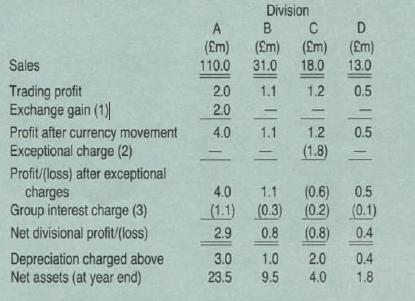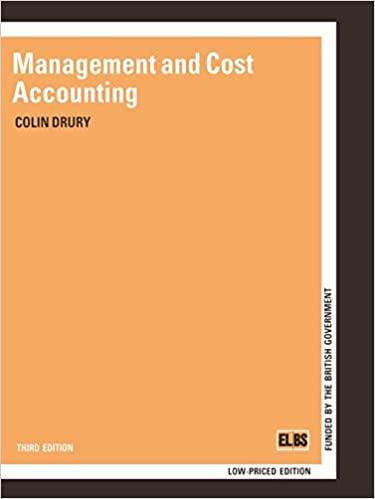Advanced: Discussion of res idual income and ROI and the problems with using the se measures to
Question:
Advanced: Discussion of res idual income and ROI and the problems with using the se measures to evaluate a specalative new division operating In a high technology industry lndico Ltd is a well established company which has operated in a sound but static market for many years where it has been the dominant supplier. Over the past three years it has diversified into three new product areas wh1ch are unrelated to each other and to the original business.
lnd1co Ltd has organised the operation of its four activities on a divisional basis with four divisional general managers having overall responsibility for all aspects of running each business except for finance. All finance is provided centrally with routine accounting and cash management, including invoicing, debt collection and bill payments. being handled by the Head Office. Head Office operating costs were £1 million in 1987. The total capital employed at mid·
1987 amounted to £50 million, of which £20 mill1on was debt capital financed at an average annual interest rate of 10%. Head Office assets comprise 50% fixed assets and 50% working capital. To date, the company has financed its expansion without raising additional equity capital. but it may soon require to do so if further expansion is undertaken. It has estimated that the cost of new equity capital would be 20% per annum. No new investment was undertaken in 1987 pending a review of the performance of each division.
The results for the divisions for the year to 31 December 1987 are as follows:

(1) The exchange gain represents the difference between the original sterling value of an overseas contract and the eventual receipts in sterling.
(2) The exceptional charge relates to the closure of a factory in January 1987.
(3) Group interest is purely a notional charge from Head Office based on a percentage of sales.
Requirements
(a) Calculate the return on investment and residual income for each division, ignoring the Head Office costs and stating any assumptions you consider appropriate. Explain how this information is useful in evaluating divisional performance, and outline the main standards of comparison you would use. (13 marks)
(b) Explain how you would deal with the Head Office costs in measuring divisional performance within lndico Ltd.
(4 marks)
(c) Discuss the problems arising from using return on investment and residual income to evaluate a speculative new division operating in a high technology industry. State how you could improve these measures to enable better divisional comparisons to be made.
Step by Step Answer:







